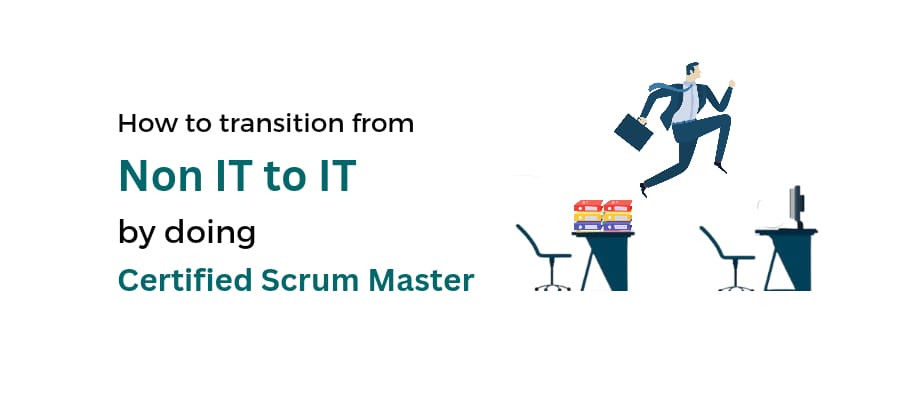Transition of Non-IT into IT field by doing CSM®

In today's quickly changing digital landscape, the demand for qualified IT experts is growing at an exponential rate. Many people with non-IT backgrounds are becoming aware of the numerous opportunities available and are looking for methods to enter the IT profession. Acquiring a Certified Scrum Master (CSM®) certification is a popular way to take this step. Scrum encourages team collaboration and helps deliver the desired results. And, if you are looking to transition into the field, a Certified Scrum Master (CSM®) qualification from the Scrum Alliance can be a great starting point.
In this blog post, we will look at how acquiring a CSM® certification can help professionals from non-IT backgrounds successfully transition into the exciting and lucrative field of Information technology. Curious to know more? Keep reading!
What is a Certified Scrum Master?
The Certified ScrumMaster (CSM) certification is a globally recognized credential offered by the Scrum Alliance. It validates an individual's understanding of Scrum principles and their ability to effectively apply them in real-world scenarios. You will learn about the many responsibilities within the Scrum Team, as well as the Scrum events and artifacts contained within the Scrum framework.
The CSM® certification signifies that an individual can facilitate and manage a Scrum Project. The certification process involves taking a two-day course with a Certified Scrum Trainer (CST) who teaches Scrum principles, practices, and values. After completing the course, the learner must pass an online examination to obtain their CSM® certificate, which is valid for two years.
Why choose CSM® to transition into IT?
CSM® certification is a great starting point for anyone looking to transition into IT. The demand for IT professionals with skills in Scrum is on the rise, and the CSM® certificate helps professionals stand out in the job market. Here are some reasons why CSM® makes a great choice for a career in IT:
1. High demand for Scrum professionals
The popularity of Scrum has increased exponentially over the past few years, and more and more organisations are adopting it as their primary Project management methodology. This has created a high demand for Scrum professionals who can implement the methodology in organisations. With the CSM® certification, an individual can demonstrate their knowledge and expertise in Scrum, making it easier to get a job in the IT industry.
2. Getting CSM® certification:
Once the basics of Scrum are known, non-IT professionals can apply for CSM® certification from the Scrum Alliance. The certification process requires completing a two-day Scrum master training course, passing a certification exam, and agreeing to the Scrum Alliance's code of ethics.
3. Professional Growth:
This certification will help you evolve not only your technical skills but also your soft skills, which are vital for professional growth. It helps you develop leadership skills, Project management skills, and the ability to deal with change.
4. Increasing Employability:
Obtaining a CSM® certification can boost one's employment prospects in the IT business greatly. Employers respect the skills and knowledge connected with Scrum and Agile techniques because of their demonstrated track record of enhancing Project outcomes and encouraging innovation.
5. Applying Scrum knowledge to IT Projects:
With the CSM® certification in hand, non-IT professionals can start applying their knowledge to IT Projects. They can have an edge over their peers because of their Project management and communication skills.
6. Continuous learning:
To maintain their CSM® certification, professionals must also stay on top of new research, trends in Scrum and Agile methodologies, and professional development opportunities.
The benefits of transitioning into the IT field with a CSM® certification are numerous. It provides an opportunity for professionals to acquire new skills, grow their careers, and potentially earn more. With an increasing number of companies adopting Agile methodologies like Scrum, the demand for CSM®-certified professionals continues to grow.
How to transition into IT?
1. Learn Scrum and Scrum Master skills by attending a CSM workshop. Our practical training approach helps you to practice Scrum withing the workshop itself with the fellow learners.
2. Practice Scrum in your non-IT industry in areas such as manufacturing, banking, teaching, marketing etc. Experience real world situations on how to handle team conflict, improve team productivity and quality. You can find many real case studies on our website under the Resources section.
3. Practice doing Scrum in your daily personal life in areas such as financial investment, school education, house hold chores, cooking etc. Our case study repository covers many personal life case studies on how Scrum is applied.
4. Alternately, form a working group within the workshop attendees, and start practicing Scrum to create a software product or a platform. Get expert help to review your work on a regular basis. Be open for feedback and make continuous improvements.
5. Ask your trainer on more ways on how to transition from non-IT to IT sector.
In conclusion, transitioning from non-IT to IT via CSM® certification is a great starting step for professionals seeking career growth opportunities. With the growing demand for CSM®-certified professionals, having this certification is becoming increasingly attractive to non-IT professionals and organisations looking to improve their Project management approach.
PremierAgile is a premier platform for obtaining this prestigious certification, providing learners with the skills and knowledge required to flourish in the IT sector. With the growing need for CSM®-certified experts, this credential is becoming increasingly valuable for both individuals seeking career progression and organisations looking to improve their Project management practises.
With PremierAgile, you'll gain exclusive access to cutting-edge Agile methodologies, training materials, and expert-led workshops that will empower you to deliver Projects with greater efficiency, collaboration, and customer satisfaction. Don't miss this opportunity to unlock your full potential and drive success in your Agile endeavours. Join PremierAgile’s world class training programs now and embark on a transformative experience!



